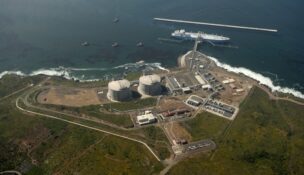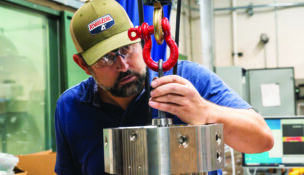Help Wanted (and Fast): The Alarming Talent shortage in Colorado’s Energy Sector
Why Colorado needs a drastic increase in skilled talent for the inevitable transition to renewable energy.
Andrew Browning //September 14, 2023//


Help Wanted (and Fast): The Alarming Talent shortage in Colorado’s Energy Sector
Why Colorado needs a drastic increase in skilled talent for the inevitable transition to renewable energy.
Andrew Browning //September 14, 2023//
The next major pipeline the energy industry in Colorado (and the entire world) must confront is a talent pipeline. Today’s real energy challenge is to find and recruit the professional talent needed for a huge increase in renewable energy projects alongside new roles that engineers, geologists and other essential traditional energy workers will take on as new clean fuels become available.
READ: America’s Energy Future Depends on Cultivating the Next Generation of Talent
The talent needed for the growing energy industry is staggering, and it’s one of Colorado’s major industries. Globally, the World Economic Forum estimates that the evolution into clean energy is expected to generate 10.3 million new jobs by 2030 alone.
As such, the renewables industry will need to quadruple its workforce by 2030 to develop, build and maintain the planned projects. Blue- and white-collar employees are needed, with an estimated 1.1 million more blue-collar workers to build water and solar plants and another 1.7 million to operate and maintain them, a McKinsey study indicates.
Add in the jobs that will be needed under the Future Fuels Act (FFA) for clean fuels like hydrogen, low-carbon biofuels, sustainable transportation fuels and more, and we’re looking at even more jobs that don’t exist yet. Overall, even with these additions, the WEF anticipates that most of the jobs will be in electrical efficiency, power generation and the transportation sector.
READ: Understanding ESG & Colorado’s Energy Transformation
Which means more skilled labor will be needed too — from construction laborers, operating engineers, electricians, project developers and managers, to finance and legal experts. And they must be forward-thinking leaders who can deliver affordable, abundant, reliable and cleaner energy to fuel expected economic growth in our state, country and the world.
In Colorado, where the labor market already is the tightest on record, the need is equally great because, thanks to the federal legislation adopted last year, billions in federal dollars and private investment are flowing to the state for its clean energy transition. As of 2021, Colorado employed over 146,000 direct jobs in energy. Meanwhile. Colorado’s advanced energy industry — advanced fuels, electricity generation, grid and energy storage and the like — employed 66,000 workers. Still, that number is expected become much greater very soon.
Energy experts note that renewable energy projects are helping the state lead a fast-growing bevy of green-development states. A growing number of large projects are being financed by lucrative tax credits and grants from the federal Inflation Reduction Act, among other legislation adopted in 2022. Plus, the state’s utilities are replacing or soon will be their coal-burning facilities with solar, wind and other renewable energy sources.
READ: Becoming a Zero-Emissions State — How Alternative Fuels Are Transforming Transportation in Colorado
Consider the need simply for construction and extraction jobs, which, according to the 2022 Colorado Talent Pipeline Report, is among the fastest-growing occupations in the state. Over the next decade, a 17.2% growth rate for such occupations, which already employ over 165,000, is expected, with nearly 20,000 openings annually at a medium yearly salary of $48,650.
Plus, while jobs in the traditional energy industry — oil, natural gas and coal — are declining due to the transition to renewables, that sector still needs skilled workers and managers. Again, the talent outlook is worrisome since an estimated 50% of the nation’s 10 million oil and gas workers are expected to retire by 2027.
What’s it going to take to seek and retain the generations of talent the energy industry demands in Colorado? Talent strategy. For the industry, and for the state and federal government.
Besides the usual training and reskilling needed, it’s important that potential talent think about the energy sector as early as middle school. This means taking advantage of the push for STEM (science, technology, engineering, mathematics) education underway in a growing number of communities.
Energy companies and their trade associations must begin to interest youth through STEM initiatives and events that spark their curiosity in energy, including summer camps and the annual Energy Day, where students can enjoy hands-on demonstrations.
in mid-2021, Governor Polis signed a bill that helps ensure employers in the renewables sector specifically will get the talent they need long-term as the state seeks to transition 100% to renewables by 2040.
This legislation requires the creation of an energy sector career pathway that’s underway by several state departments and the Colorado Workforce Development Council, which will increase training, apprenticeship and education programs to equip workers with the skills needed in the energy sector.
Increasing access and opportunity to allow Colorado youth to consider energy as a profession has never been more necessary. STEM education is just one way for our state to build a talent pipeline the workforce of the future will need. Otherwise, the energy talent shortage will persist, hurting not only our state’s energy progress but our economy too.
 Andrew Browning is the chief operating officer of Consumer Energy Alliance and the organizer of Colorado’s Energy Day festival.
Andrew Browning is the chief operating officer of Consumer Energy Alliance and the organizer of Colorado’s Energy Day festival.

























